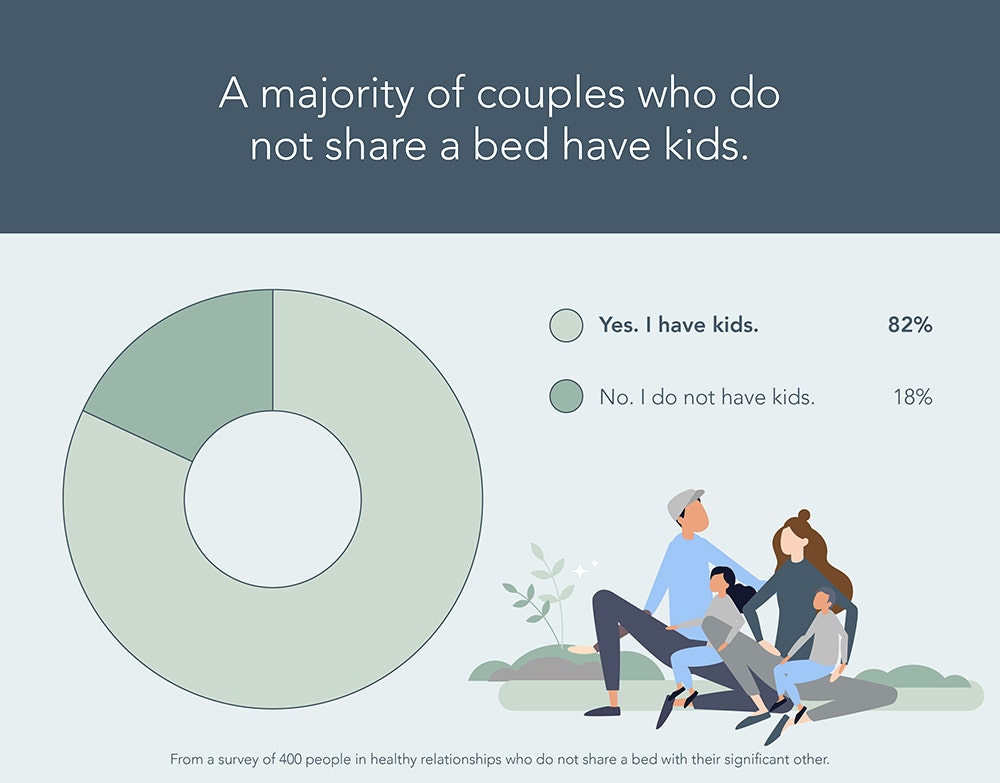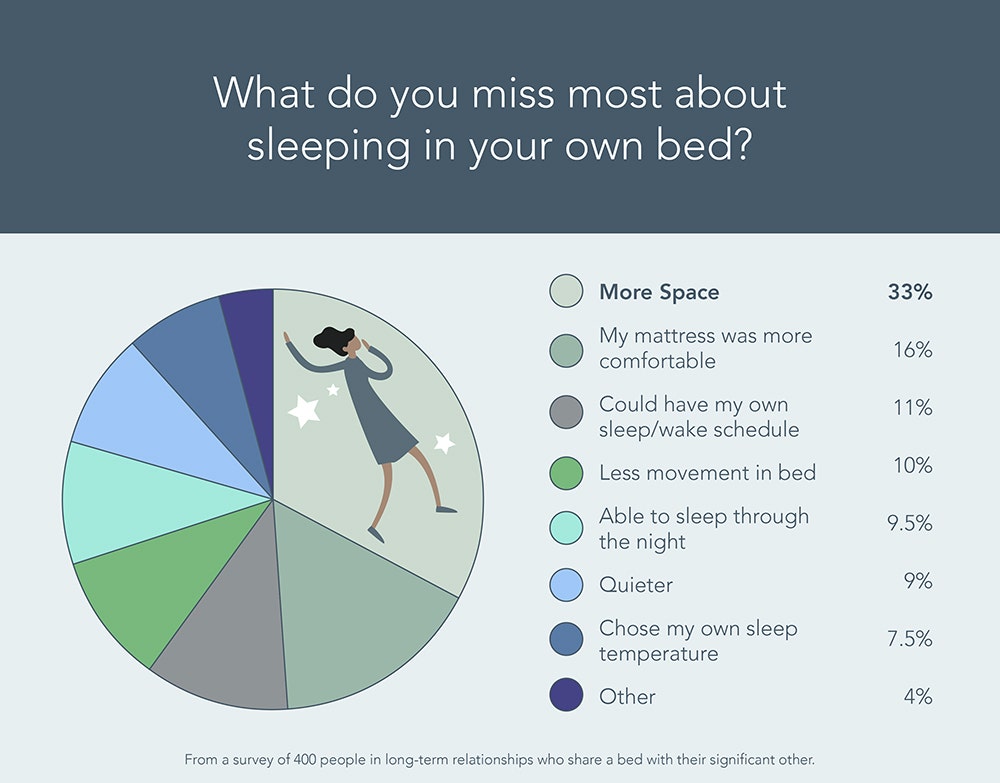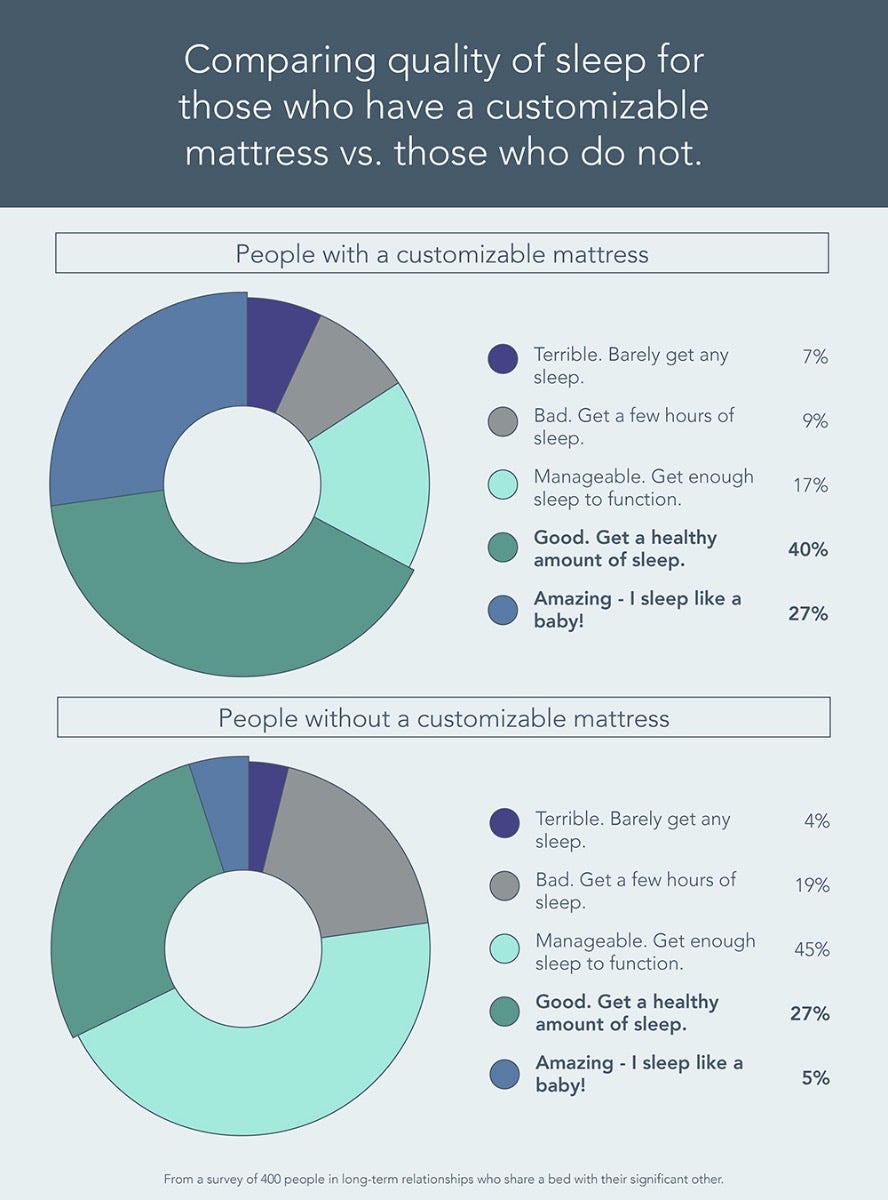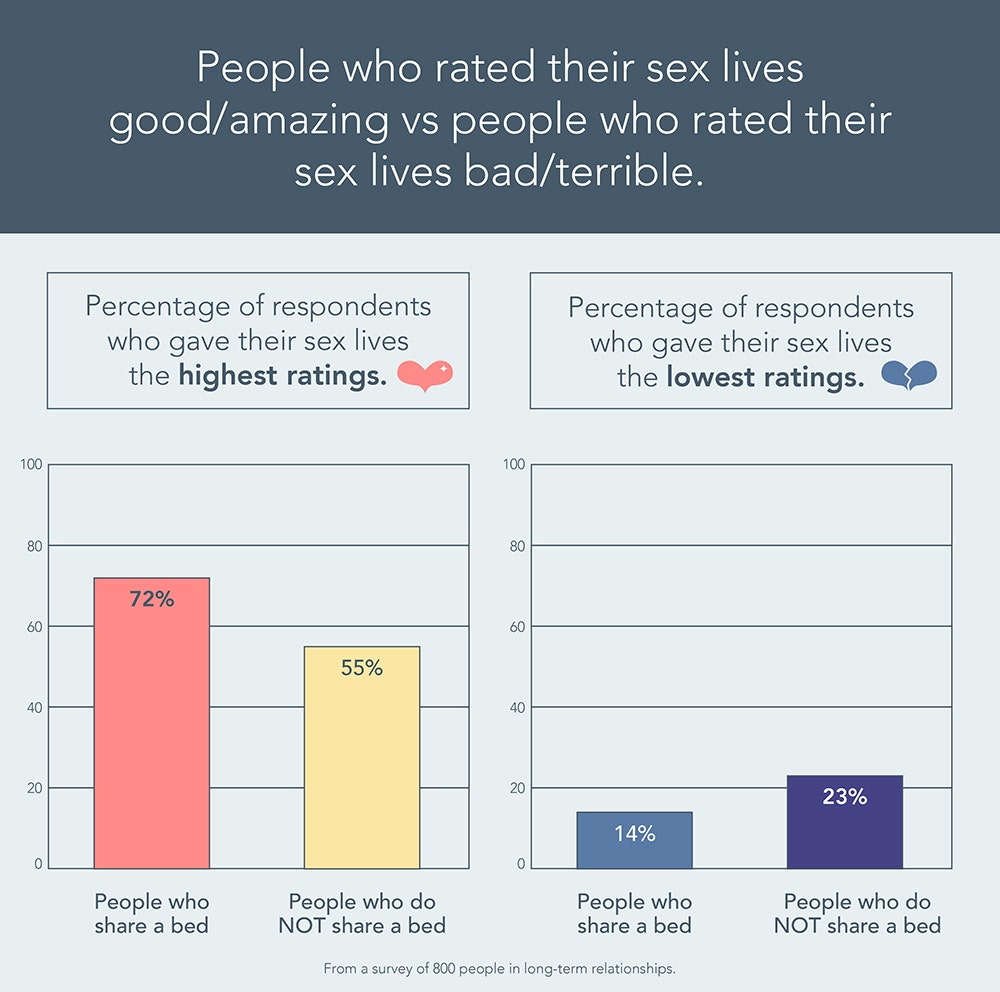Search
organic
For Bed or for Worse: People Who Sleep Separately Get Better Sleep but Are Less Happy in Their Relationships
If you're a fan of classic television, you've seen the TV couples happily sleeping in separate beds. You may have thought this was nothing more than a way of keeping things G-rated. However, sleeping in separate beds or rooms is a choice made by many real-life modern couples.
To learn about why couples do this and their experiences with doing so, we surveyed 800 people:
- Half of the participants are in healthy relationships with their significant others, with whom they once shared a bed but now sleep separate.
- The other half are in long-term relationships with their significant others and currently share a bed with them.
We asked survey respondents questions about their sleep and relationship qualities and their opinions about sharing – or not sharing – a bed with their S.O.
To summarize the results, we learned:
- Sleeping separately improved sleep quality and reduced stress.
- Sleeping together resulted in healthier sex lives and happier relationships.
So … do you value sleep quality and low stress levels or intimacy and happiness? Eek, talk about an impossible question.
But what if you could, over time, have both? We’re not in the couples therapy business, but our primary takeaway is that couples may want to sleep separately over the short term to handle specific issues, such as conflicting work schedules. However, resolving any temporary issues and eventually returning to a shared bed may be the best option for many couples.
Let’s get into some of the key insights!
Note: There is no one-size-fits-all way of sleeping. None of our statements should be considered medical or psychological advice. All worrisome sleep, health or relationship issues should be discussed with a medical or psychological professional.
Snoring and conflicting sleep/wake schedules are the two main reasons people sleep in separate beds.
There are several reasons people love sleeping alone, even if they're in committed relationships. A majority of people who sleep separate from their significant other said snoring and conflicting sleep/wake schedules were the reasons they decided to stop sharing a bed.


While snoring and conflicting sleep/wake schedules received 57% and 56% of the overall vote, respectively, we did find some interesting differences between generations:
- Conflicting Sleep Schedules: 63% of Millennials and 62% of Gen Z-ers say conflicting sleep/wake schedules are why they sleep in separate beds or rooms.
- Snoring: 68% of Baby Boomers report snoring was their deciding factor.
- Intimacy Issues: 23% of Gen X and 28% of Millennials who sleep apart also reported "intimacy issues" were a significant cause.
- Mattress Preferences: Gen Z-ers were the most likely to say they wanted control over their mattress' firmness or softness.
- Sleep Disorders: 54% of Millennials stated sleep disorders caused them to sleep separately, compared to only 22% of Baby Boomers.
Over 40% of people who share a bed with their significant others said sleep issues have caused them to question their relationship.
When many people picture a long-term relationship, they imagine peacefully sleeping next to their partners. However, things aren't necessarily as simple as that.
About 44% of respondents say sharing a bed with their partners has made them wonder if this relationship can work. That group stated the primary reasons for questioning their relationships based on bed-sharing were:
- Snoring: 78%
- Conflicting Sleep Schedules: 71%
- Differing Sleep Temperature Preferences: 58%


Snoring could be caused by a medical issue – which may be treatable – or alleviated with over-the-counter options. White noise machines may also help.
The other two issues require a bit more trial and error if you want to continue sleeping together.
Regarding conflicting schedules, experts suggest attempting to go to bed simultaneously (presuming the schedules aren't totally opposing, like one works day and the other nights) can be helpful, even if it takes time to adjust.
They also say you needn't sleep together every night – this isn't an all-or-nothing situation!
Finally, for differing preferences in sleep temperature: The Sleep Foundation reports the best temperature for sleeping is between 60 and 67 degrees, so try different options in that range.
If you're a hot sleeper, you can check out different ways to set up your room during the day, alter your daytime routines or change your bedding to organic cotton to alleviate the warmth.
Additionally, try cooling bedding and varying thicknesses of blankets (or even electric blankets) to determine what works best for both of you.
60% of people who sleep separately feel less stressed.
While there's something comforting about sleeping next to – or at least cuddling with – a significant other, over half of respondents who don't sleep with their partner say they're less stressed during the day compared to when they shared a bed.


This doesn't mean they hate their partner; it could be because they sleep better than they did while sharing a bed. Sleep quality and stress are directly connected.
People who sleep separately report better sleep.
We asked our respondents to rate sleep quality on a scale of 1 to 5, with 4 being "Good" and 5 being "Amazing."
Sleeping separately seems to allow for better sleep than sleeping together: 60% of people who don't share a bed rate their sleep quality at a 4 or 5 compared to 51% of those who share one.
Generational differences arise here as well.


- Baby Boomers who rated their quality of sleep a 5 and:
- Sleep separately: 27%
- Share a bed: 10%
- Gen X-ers who rated their quality of sleep a 5 and:
- Sleep separately: 28%
- Share a bed: 9%
- Millennials who rated their quality of sleep a 5 and:
- Sleep separately: 21%
- Share a bed: 22%*
- Gen Z-ers who rated their quality of sleep a 5 and:
- Sleep separately: 27%
- Share a bed: 4%
Further, over one-fourth of Gens X and Z rate sleeping in a shared bed at a 2 (Bad) or 1 (Terrible).
*Millennials are the only generation who report better sleep when sharing a bed
Most respondents who sleep in separate beds have kids.


The vast majority of respondents – over 82% – who sleep separately have children.
It’s worth noting the American Academy of Pediatrics recommends at least one parent sleeps in the same room as their infant children as this may reduce the chance of SIDS..
They further advise that the baby's mattress should be apart from the parent's bed for this exact reason.
So, it's reasonable to assume these may be the reasons parents choose to sleep separately. They could also need uninterrupted sleep, or perhaps there isn't enough space for one room to have a two-person bed plus a crib.
People who sleep separately fall asleep faster than those who share a bed.
Want to fall asleep fast? You may want to consider sleeping separately, at least for a while. A total of 90 respondents who sleep separately from their partners say it takes them 10 minutes or fewer to fall asleep, compared to 75 respondents who share a bed.


Whether they sleep with a partner or alone, most people said looking at their phone, watching Netflix, YouTube, or similar, or reading helped them fall asleep quickly.
Blue light, which comes from electronic screens, is generally believed to harm sleep quantity and quality.
That said, if you think being on a device may help you sleep, you could try blue light glasses or an app intended to filter your device's blue light. You can also find other types of apps created to help you sleep.
Most people who share a bed miss the space they used to have.
What do people who share a bed miss the most about having their own beds? The space! About one-third of those who share a bed would love to have more room.
The runners-up for reasons people miss sleeping alone are having a more comfortable mattress, more control over their sleep/wake schedules, and no interruptions from others' movement.


When focusing in on the different generations:
- A majority of Baby Boomers said their partners' movements throughout the night were the primary reason they missed having their own beds. Luckily, this can be overcome by using a movement isolating mattress.
- Gen Z-ers had the highest percentage of respondents who said what they missed most about their old mattress was how comfortable it was. But an uncomfortable mattress can easily be upgraded with a mattress topper: an effective and relatively inexpensive fix!
People who sleep separately report their relationships greatly improved after choosing to sleep in separate beds.
About 19% of respondents said their relationship was "Amazing" BEFORE they slept separately…


And 26% of respondents said their relationship was "Amazing" AFTER sleeping separately.
But, more people who share a bed rate their relationship as "Amazing" than people who don't share one.
We asked people to rate their relationship on a scale of 1 (Terrible) to 5 (Amazing).


Of those who share a bed, 131 gave their relationship a 5. That's about 33% of those we surveyed.
Only 107 – about 27% – of those who don't share a bed gave their relationships a 5, despite reporting better sleep quality.
However, you don't have to choose between having a good relationship or a good night's sleep. It's all about finding what works for you.
People with customizable mattresses report higher quality sleep.


We asked respondents who share a bed if they have a mattress that allows them to customize their side to their preferred level of firmness.
- 67% of people with this kind of customizable mattress rated their quality of sleep as "Good" or "Amazing."
- Meanwhile, 32% of those who don't have a customizable sleeping setup rated their sleep quality as "Good" or "Amazing."
In other words, the percentage of respondents who get good or amazing sleep with a customizable mattress is more than double the percentage of those who don't have a customizable mattress.
These folks didn't have to choose between sleeping together and sleeping comfortably!
People who share beds report better sex lives than those who don't share beds—but there are ways to fix this!
Let's be honest: Most people considering sleeping separately are probably wondering, "Will sleeping apart from my partner hurt our sex life?"


We wondered the same thing, and asked respondents to rate their sex lives on a scale of 1 (Terrible) to 5 (Amazing). Here’s how the numbers break down when looking at those who rated their sex life as:
- 4 (Good) or 5 (Amazing): 72% of those who share a bed and 55% of those who do not share a bed
- 2 (Bad) or 1 (Terrible): 14% of those who share a bed and 23% of those who do not share a bed
So, of our respondents, people who share a bed were more likely to report a positive sex life than those who don't.
However, sleeping separately doesn't doom your sex life. Jill Lankler, a clinical psychologist and life coach, told USA Today that communication is key to sleeping separately while maintaining an enjoyable sex life. She states partners who choose to sleep in separate beds should express their expectations and intentionally carve out time for intimacy.
Married couples are more open to sleeping in separate beds but also think it’s a bad omen for the relationship
Our poll asked people who currently share a bed if they would ever consider not sharing one. Additionally, we asked them if they believed this was a sign of disaster for a relationship.
We included both married and cohabitating couples in our study. While 62% of married couples said they would try sleeping in separate beds if needed, only 24% of unmarried couples were on board with the idea.


Ironically, a majority (66%) of married people—the ones more willing to sleep alone—also thought it was a bad sign for a relationship.
People love cuddling!
Cuddling (amongst other forms of physical affection) has been shown to boost mood, lower blood pressure, and even aid in weight loss by releasing oxytocin. No wonder people can't get enough.
We asked people who sleep separately what they missed most about sharing a bed, and most said cuddling.


And when we asked people who share a bed what they like most about sharing a bed, a majority of respondents also said cuddling.
Intimacy and sex were in second place for both couples who did and did not share a bed.
Nearly all respondents who sleep in separate beds said they think they'll share a bed with their S.O. in the future.
As mentioned, sleeping separately doesn't have to be permanent. This route can be a temporary solution to a challenge, like taking on a night shift, handling a new baby or dealing with an illness or injury.
Or, it can just be something a couple is trying out because they want to see if it works for them.
Regardless of the reason, nearly all people we surveyed – 83% – who currently sleep separately from their partners believe they'll end up sharing a bed again.


Whether you and your partner are looking for separate beds or the perfect mattress for couples, Naturepedic may have just the things you need.
We offer a variety of non-toxic mattresses, including some that are customizable to your individual comfort levels, and organic bedding to help you get your best night's sleep, whether you’re sleeping alone or with the one you love.
 BABY
BABY  KIDS
KIDS  ADULT
ADULT  LEARN
LEARN  STORES
STORES